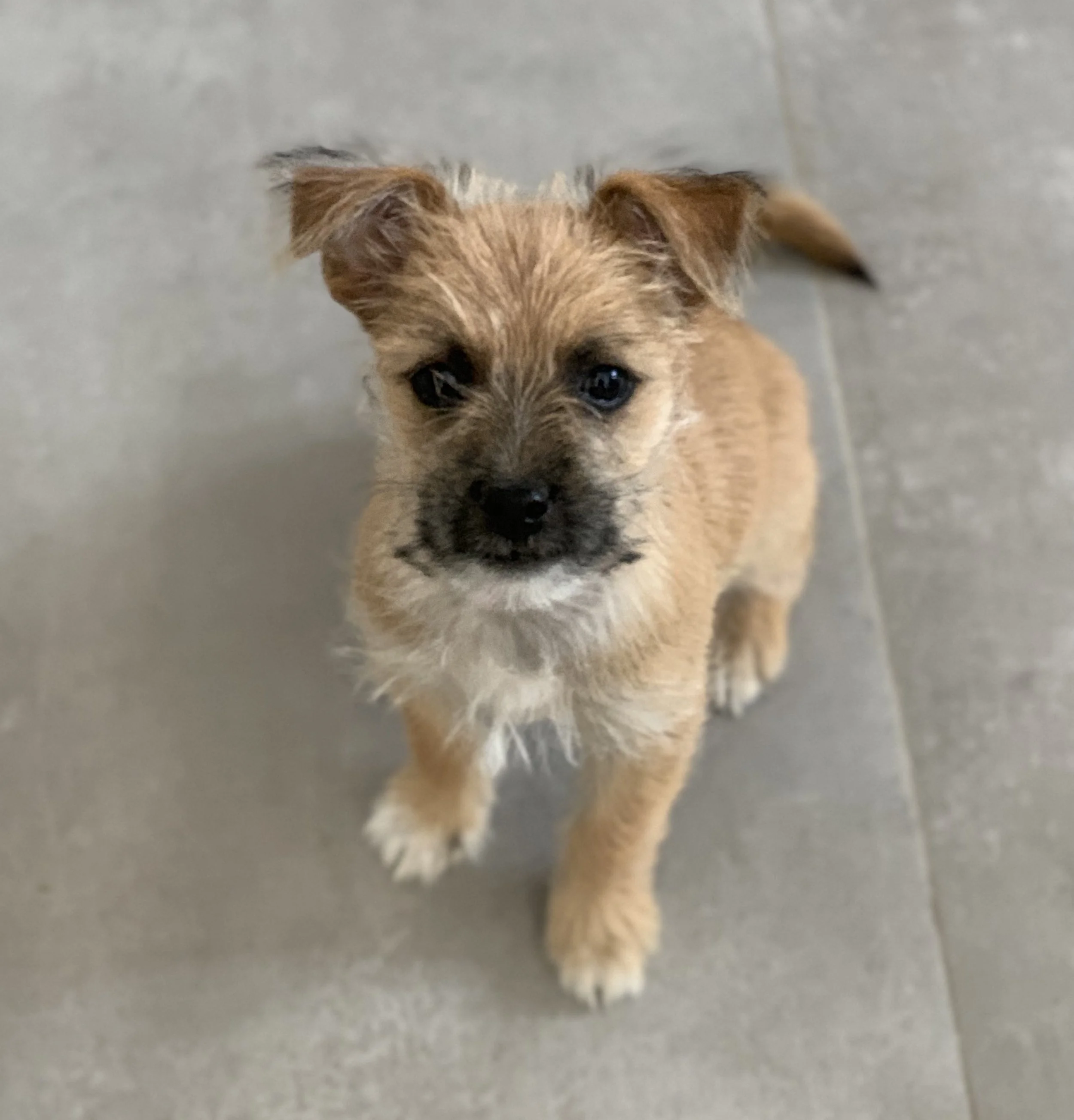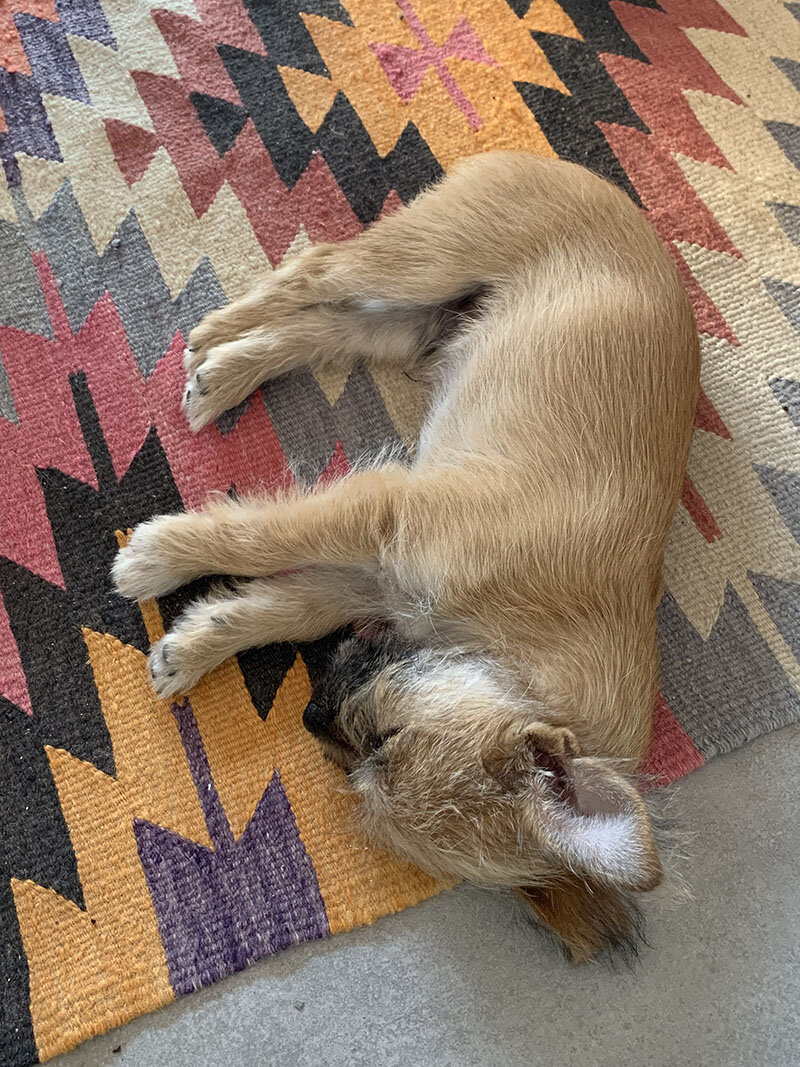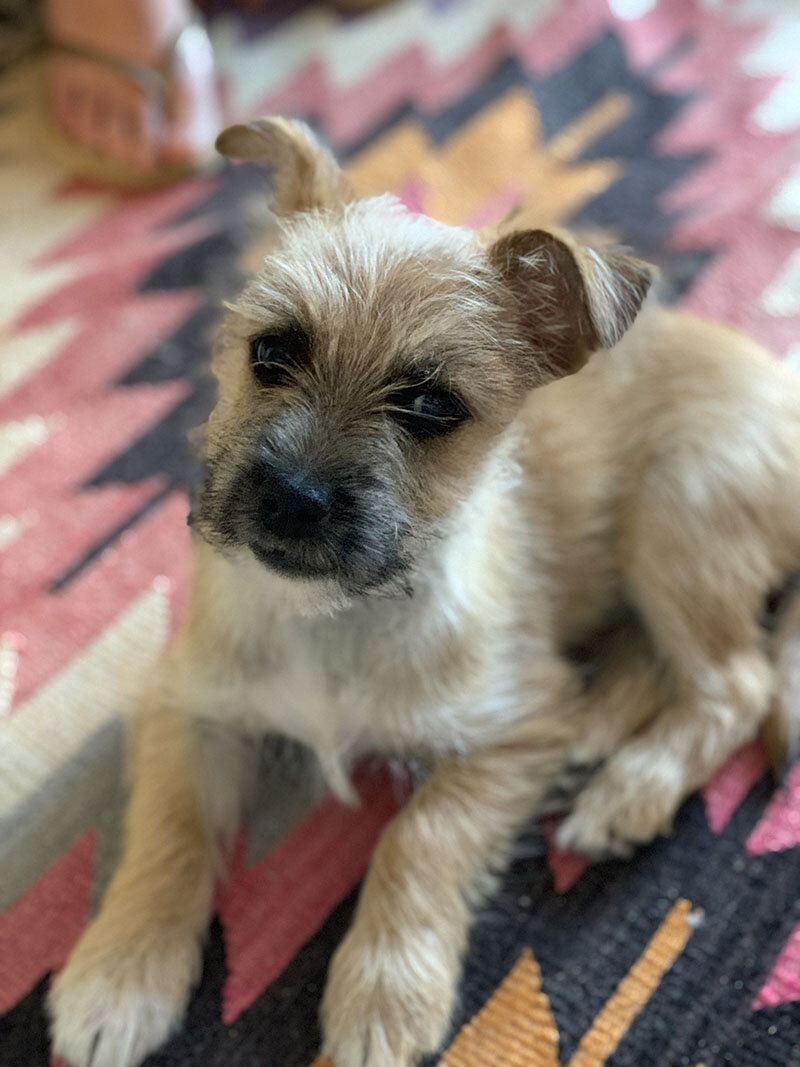Alfredo Menéndez
Suddenly, we find that our family here in Spain has grown by a very small amount.
Since moving to Spain, the thought of having a dog has always been on our mind, but with so much going on in terms of work and house-building, there never seemed to be a right time. So often we have discussed the idea and, although we have always fancied having a little dog pottering around, we convinced ourselves that the commitment of another member of the family might not be something we could meet right now.
In Spain, temptation and need is around every corner. On Facebook, almost every day, there will be a new post featuring some poor animal that has been abandoned and in need of a new home. The relationship that too many Spanish people have with animals is something that doesn’t sit well with a large percentage of non-Spanish people, to whom domestic pets are very much part of the family. When we first moved to Spain, we read Gerald Brenan’s book, “South from Granada” and in one of the chapters of that book, Brenan does a good job of describing the Spanish relationship with livestock and animals, and we would urge everyone who lives in Andalucia to read Brenan’s book as his insights are as relevant today as they were when he lived in Las Alpujarras in the early 1920s. Brenan writes;
“It is one of the Englishman’s most cherished beliefs that whereas he is devoted to animals and will risk his life any day to save a cat or a dog, or to give a fox a little healthy exercise, the foreigner, and particularly the Spaniard and the Italian, does not like them and often treats them with cruelty. I can only say that it would be easy to make out a case for the exact opposite.”
Brenan goes on to describe that many Spanish farming folk certainly respect their livestock and believed them to have nobility. The dog, however, was not necessarily considered noble and due to the way that village dogs were typically treated by the local boys, they became timid and therefore lost respect, but that said, there were many Spanish folk who did have the financial wherewithal to look after their domestic animals as well as anyone else.
Read Brenan’s book for more detail, but bear in mind that much of the relationship that rural Spanish people have with their animals stems from great poverty. If an animal became sick or could no longer help the family, this was a trauma. The family were often bereft at such a calamity as they could not afford a replacement, and neither could they kill any animal that had lived in their home. The answer, then, was to leave the animal to its own devices and that could so often be perceived as abject cruelty. It may be considered a twisted perspective but it is important to try to set these things in context and understand why certain things happen.
With the advent of resident non-Spanish people in so many parts of Andalucia, it is now common for cats and dogs to be deposited at the gates of a foreigner in the knowledge that the animals will be provided for. Fiestas are also an opportunity for animal owners to get rid of unwanted litters when there are lots of people around, and the likelihood of a new home is at its greatest. It is distressing to find litters of kittens or puppies in a skip, and this is a problem that is never going to be easy to solve unless there are teams of financially-supported vets who tour villages offering free neutering services.
Animal cruelty happens everywhere, but it is important not to label every animal-owning Spaniard as cruel. History and culture determines the relationship that exists between animal and owner and this may not be the same environment that we, non-Spanish people enjoyed when we were growing up.
Anyway, we resisted Facebook appeals for many months as we both knew that we had too many other things to factor in - finishing the house, running our creative course holidays, having friends and family to stay.
However, recently, our next door neighbour’s dog had a litter of three puppies. Manolo’s dogs do not have the best life, and Manolo himself has been slightly ostracised from the village because one of his dogs, in the past, killed the dog of one of our lovely Spanish neighbours. His current tribe of dogs includes a rather large black hound that is penned up for most of the day and then a collection of smaller creatures that bark at every opportunity. They used to have a clear view into our garden but Manolo has moved them further away as he knew that they presented something of a nuisance.
A few weeks ago, his bitch found her way into our house and then into the back garden where she lay down in the sun. She presented such a tragic figure, and her expression was crying out for us to take her away from the life she was leading, probably on her third of fourth litter and she is certainly not old. We had awful thoughts that the puppies, as soon as they were born, might just ‘disappear’. However, we were surprised when, soon after, Manolo took us to one side to show us the three new puppies tucked away in one of the sheds next to his house, with Mum looking proudly on. It was at that moment that we very nearly succumbed, as the puppies were rather sweet, and were clearly being looked after.
As we were deliberating, we were visited by a friend, Gym, who had come to see the house and I took her to see the pups. Gym, quite rightly, said that there were so many abandoned puppies everywhere that if we were considering getting a dog, it might be as well to take in one that really needed a home. Manolo’s pups were being fed and were dry and safe and still with their mum. Gym added that our dog would find us, as opposed to the other way round, and little did we know that our dog would indeed find us very shortly afterwards.
That same week, we received a FaceTime call from our great friends, Nick and Richard who had heard an almighty din from somewhere in the countryside not far from their home in the Lecrín Valley. They went off to investigate and found a tiny puppy howling from beneath a bush on the valley side, evidently abandoned. We answered the FaceTime call to see images of this little scrap and knew that we couldn’t resist. It happened all rather quickly, and we lamely suggested that we could foster the little chap, not quite sure whether we were immediately ready to commit to a lifelong relationship. I think we both knew that this was a ‘no going back’ decision, but just seeing this pup’s tiny Border Terrier-like face, and whispy ears melted both of our hearts.
The next day, Nick and Richard came with the puppy in a travelling box, lined with a new bed and various accoutrements that we might need as new parents. So it was that Alfredo Menéndez arrived in our home, believed to be aged only around 8 weeks.
Alfie settled in remarkably quickly. There was no sign of timidity or anxiety. It was almost as if he realised how lucky an escape he had had, finding a warm and loving home. There was no sign of any ill-treatment, and he looked as though he had not been out alone for that long. It did cross all our minds that maybe someone had lost him by mistake, but there have been no reports of any missing puppies, and he was found fairly deep in the countryside so could not really have conceivably walked from anywhere nearby.
Andrew and I acknowledge that, if we had been asked to describe the perfect dog for us, then Alfie would fit that bill. I love Border Terriers as they have such character and a great temperament. From his appearance and size, Alfie has quite a large percentage of Border in him, but there are other ingredients that lend an Ewok-ish quirkiness. He has whiskers everywhere, and soft dark hairs provide his silky ears with a halo; his little muzzle is framed by tufts that sprout at all angles and his little tummy is warm and downy.
Puppies do change the routine of the house, and the timing of Alfie’s arrival may not have been the best moment as we had several very busy weeks following his entry into his new home. Firstly, we had the Fiestas en Honor del Santisimo Cristo del Paño in the village, and the children came to visit for that huge event. Alfie had only been with us for a matter of days and he was suddenly surrounded by people. Mind you, getting used to people at such a young age was no bad thing, and he loved the attention.
The fiesta was followed soon after by the last of our creative courses for this year, and we had to flit back and forth between the course venue and home, making sure that Alfie was settling in. It did add another element to what turned out to be quite a full-on week of work as we looked after our guests to ensure they had the best possible experience. Fortunately, the course went swimmingly and Alfie met more new and exciting people and was on the receiving end of yet more loving attention.
I am not sure such a hectic couple of weeks helped us with getting Alfie house trained, and he took rather too much of a keen interest in all our new and expensive rugs. Ideally, we should have been here constantly so we could trot him out to the garden whenever there was any desperate look. However, little Alfie is now firmly settled in his home, and rather loving life here, we hope. He is the loveliest little chap, with oodles of character and courage despite his diminutive stature. Our neighbours love him, and frequently ask how big he might grow and the answer to that question is that we really don’t know. His paws are fairly small, so we doubt he will grow too much - a good, manageable size with lots of energy to encourage us to get out and walk around this gorgeous place.
So, that is how we found ourselves with a small and somewhat unexpected addition and our lives here take on yet another dimension. Life is good, and there is something immensely comforting about sitting next to a roaring fire as the evenings get darker and chillier and there, flat out on the hearth rug, lies a furry little creature. Welcome, Alfredo Menéndez.


















